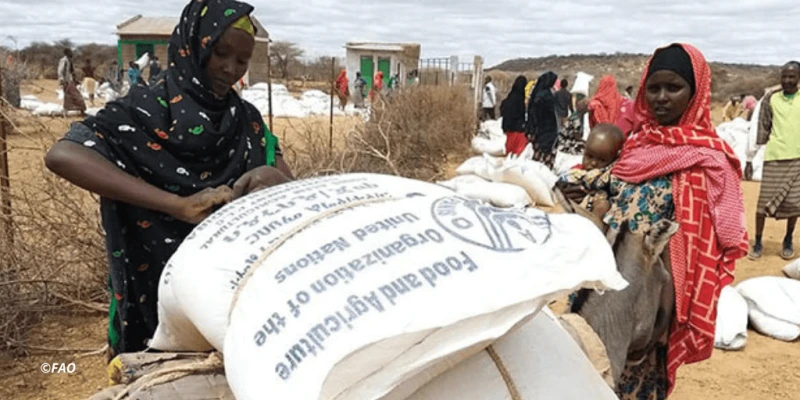Ethiopia faces confluence of crises: Locust outbreaks, flooding and COVID-fueled food shortages
Ethiopia faces confluence of crises: Locust outbreaks, flooding and COVID-fueled food shortages


COVID-19, flooding and the locusts outbreak are creating a humanitarian crisis in Ethiopia with many people unable to meet their daily food needs. Recent heavy rainfall has led to flooding, resulting in destruction of crops, loss of livestock and displacement. Swarms of multiplying desert locusts have also been destroying pastures and crops, leading to further food insecurity.
Some areas are recording admissions for severe acute malnutrition at 50% higher than for the same period last year. A massive twelve fold increase in Covid-19 cases between June and September is further compounding needs as families have been unable to obtain income or access food due to movement restrictions. Ethiopia currently holds the highest Covid-19 caseload in East Africa.
The International Rescue Committee (IRC) is working to safeguard the lives of affected and at-risk communities from the COVID-19 pandemic by raising community awareness on COVID-19 risk factors, providing personal protective equipment, and building and installing water points to help people practice preventative methods. The IRC is assisting desert locust and flood-affected households with multi-purpose cash transfer and non-food items to fill food security gaps and provide relief.
Frank McManus, IRC Ethiopia Country Director says:
“The multiple issues of flooding, locusts, intercommunal violence and COVID-19 are highly concerning given the already massive humanitarian needs in the country. The slowdown of the economy and lockdown restrictions mean that people have not been able to access income and there is an upward pressure on food prices.
“Over 19 million people are in need of humanitarian assistance in Ethiopia. At four times the number of people displaced in 2019, as a result of the flooding, more than 300,000 people have been displaced in 2020 and have had their homes and livelihoods lost or damaged. A total of over 1 million people have been adversely affected by the floods overall.
With the spread of COVID-19, people that have been displaced are amongst the most vulnerable due to the often congested living space, compromised health conditions, and inadequate access to basic services. The IRC is providing essential support through distributions of non-food items, including emergency shelter, household goods, hygiene kits, and cash assistance to over 36,500 affected people.”
“Despite the IRC’s work, the unmet humanitarian needs are still great. With more funding for our work, we will be able to reach even more people with the critical support they so desperately need after losing their homes and livelihoods.”
Ethiopia is one the poorest countries and has suffered decades of drought, intercommunal violence, disease outbreaks and flooding. Whilst grappling with its own development and humanitarian needs, Ethiopia is also a major host country for refugees in the region. In a highly complex humanitarian setting with seven million people who are acutely food insecure, IRC is working to ramp up support to those most in need.
Read the original post

 | Videos | More... |

Video: Nuclear energy will destroy us? Global warming is an existential threat? Chemicals are massacring bees? Donate to the Green Industrial Complex!
 | Bees & Pollinators | More... |

GLP podcast: Science journalism is a mess. Here’s how to fix it

Mosquito massacre: Can we safely tackle malaria with a CRISPR gene drive?

Are we facing an ‘Insect Apocalypse’ caused by ‘intensive, industrial’ farming and agricultural chemicals? The media say yes; Science says ‘no’
 | Infographics | More... |

Infographic: Global regulatory and health research agencies on whether glyphosate causes cancer
 | GMO FAQs | More... |

Why is there controversy over GMO foods but not GMO drugs?

How are GMOs labeled around the world?

How does genetic engineering differ from conventional breeding?
 | GLP Profiles | More... |

Alex Jones: Right-wing conspiracy theorist stokes fear of GMOs, pesticides to sell ‘health supplements’




 Trust issues: What happens when therapists use ChatGPT?
Trust issues: What happens when therapists use ChatGPT? California, Washington, Oregon forge immunization alliance to safeguard vaccine access against federal undermining
California, Washington, Oregon forge immunization alliance to safeguard vaccine access against federal undermining Fighting deforestation with CO2: Biotechnology breakthrough creates sustainable palm oil alternative for cosmetics
Fighting deforestation with CO2: Biotechnology breakthrough creates sustainable palm oil alternative for cosmetics Viewpoint — Fact checking MAHA mythmakers: How wellness influencers and RFK, Jr. undermine American science and health
Viewpoint — Fact checking MAHA mythmakers: How wellness influencers and RFK, Jr. undermine American science and health 30-year-old tomato line shows genetic resistance to devastating virus
30-year-old tomato line shows genetic resistance to devastating virus The free-range chicken dilemma: Better for birds, but with substantial costs
The free-range chicken dilemma: Better for birds, but with substantial costs Viewpoint: Video — Big Solar is gobbling up productive agricultural land and hurting farmers yet providing little energy or sustainabilty gains
Viewpoint: Video — Big Solar is gobbling up productive agricultural land and hurting farmers yet providing little energy or sustainabilty gains ‘You have to treat the brain first’:Rethinking chronic pain with Sanjay Gupta
‘You have to treat the brain first’:Rethinking chronic pain with Sanjay Gupta
